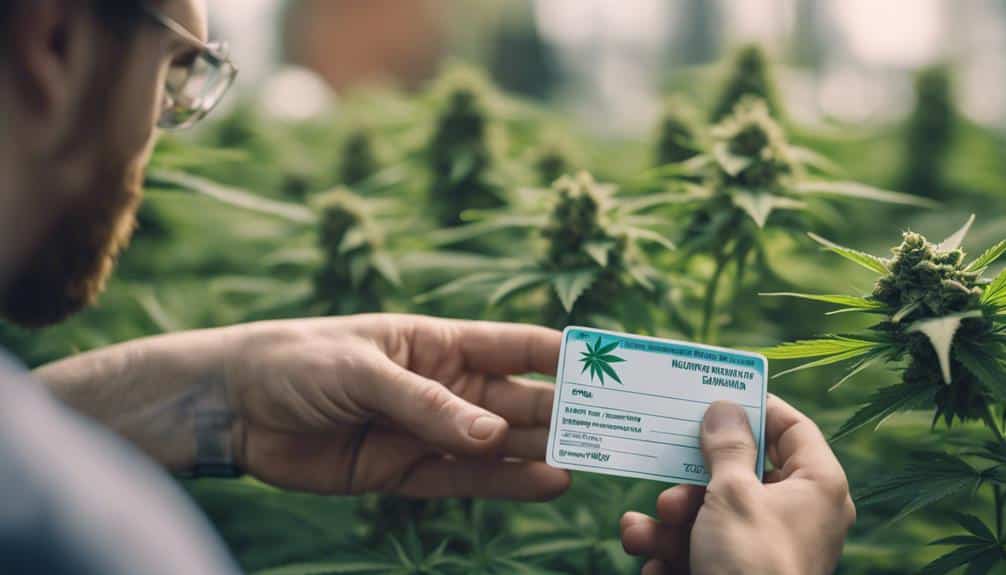If you’re familiar with the sneezing, itching, and watery eyes that accompany seasonal allergies in Delaware, you may have wondered if medical marijuana could provide relief. There’s intriguing research suggesting that cannabinoids in cannabis might interact with your body’s immune response, potentially reducing allergy symptoms. But what’s the real story? Is this a viable option for you in Delaware? Let’s delve deeper into this topic.
Table of Contents
Understanding Seasonal Allergies

When spring unveils its vibrant colors, many find themselves battling seasonal allergies—those pesky immune responses to airborne pollen from trees, grasses, and weeds. You’re not alone; millions worldwide share your struggle. Understanding what triggers these allergies and how your immune system reacts is the first step towards managing them.
Allergy triggers like pollen are harmless to most people. However, in allergy sufferers, the immune system mistakenly identifies these particles as threats and mounts a defense. This results in the release of chemicals like histamine leading to familiar allergy symptoms such as sneezing, runny nose, itchy eyes, and even asthma attacks.
Interestingly enough, the severity of your symptoms isn’t directly linked to the amount of pollen in the air but rather to your immune system’s sensitivity to it. That’s why moving to a different locale won’t necessarily help; your immune system will adjust to new allergens.
The quest for newer and more effective ways to combat allergies is driven by empathy for your struggles. It’s about serving you better, alleviating your discomfort, and improving your quality of life. With a good understanding of allergy triggers and immune response, you’re better equipped to tackle seasonal allergies head-on.
The Science Behind Medical Marijuana
Medical marijuana—a substance long stigmatized—is now gaining recognition for its potential therapeutic benefits, including its potential to alleviate some symptoms of seasonal allergies.
Delving into cannabis pharmacology reveals that the plant contains over 100 compounds known as cannabinoids. These interact with your body’s endocannabinoid system—a complex cell-signaling system that plays a key role in maintaining bodily homeostasis. The two most notable cannabinoids—THC and CBD—have been extensively studied for their therapeutic indications.
THC (tetrahydrocannabinol) is the compound responsible for marijuana’s psychoactive effects but also has potential therapeutic properties. It’s been indicated for pain relief, nausea reduction, and appetite stimulation among other things. CBD (cannabidiol) doesn’t induce a high but has been suggested to help with anxiety, seizures, and inflammation.
Research into the therapeutic indications of these cannabinoids is ongoing. The current understanding supports the use of medical marijuana for various health issues; however more studies are needed to fully uncover its potential. Remember that while marijuana may offer relief; it’s not a cure-all and should be used responsibly.
Cannabinoids and Allergy Relief

So, how might cannabinoids offer relief for those pesky seasonal allergies? The answer lies in the interaction between cannabinoids and the body’s cannabinoid receptors. Your body is equipped with an intricate system of these receptors designed to respond to different cannabinoids.
Here’s a quick breakdown of how it works:
- When you encounter an allergen, your body’s immune cells release histamines causing symptoms like sneezing, itching, and watery eyes.
- Cannabinoids found in cannabis bind to cannabinoid receptors in your body.
- This binding modulates the immune response potentially reducing histamine release.
- As a result, allergy symptoms may be less severe or even disappear.
Legal Status of Medical Marijuana in Delaware
Navigating the legal landscape of medical marijuana in Delaware may seem daunting but it’s important to understand that the state has fairly progressive laws. Delaware’s marijuana regulations are designed to serve those who truly need cannabis for medicinal purposes demonstrating statewide cannabis acceptance that’s ahead of its time.
Understanding Delaware’s legislation is key to grasping the state’s attitude towards marijuana. In 2011, Delaware legalized medical marijuana becoming the 16th state to do so. This move aimed at alleviating suffering for many Delawareans living with chronic illnesses. It signals that the state values its citizens’ wellbeing and recognizes potential benefits of cannabis.
In Delaware, medical marijuana isn’t only permitted but encouraged for those who meet qualifying conditions. It reflects a compassionate approach aiming at improving quality of life by embracing therapeutic potential of cannabis. You could say that Delaware’s laws reflect growing understanding and acceptance of marijuana’s medical utility.
How to Obtain Medical Marijuana in Delaware

Obtaining medical marijuana in Delaware involves a clear yet meticulous process designed to ensure only those with qualifying conditions have access. It’s a careful balance between the qualification process and the prescription procedure, all to ensure safety and efficacy for you and others.
Here’s an analytical breakdown:
- Doctor’s Evaluation: A licensed Delaware physician must certify that you have a medical condition that qualifies under the state’s guidelines. This includes allergies if they severely impact your quality of life.
- Patient Registration: If you have a qualifying condition, you’ll register on the Delaware Medical Marijuana Program’s website. This involves providing personal information, your physician’s certification, and a registration fee.
- Wait for Approval: After submission, the Delaware Division of Public Health reviews your application. You’ll receive your medical marijuana card if approved.
- Purchase at a Dispensary: With your card, you can now purchase medical marijuana from a state-licensed dispensary. They’ll guide you on the right products to help manage your symptoms.
Personal Experiences and Case Studies
Diving into personal narratives and case studies reveals how medical marijuana has significantly impacted managing seasonal allergies for some Delaware residents. Patient testimonials reveal vivid accounts of allergy sufferers who previously found little relief from conventional treatments experiencing substantial improvements using medical cannabis.
One case involved a middle-aged woman experiencing severe pollen allergy triggers each spring. After cannabis treatment, her symptoms decreased significantly, and she was able to enjoy outdoor activities without the constant fear of an allergic reaction. Her story is echoed by many others who’ve found similar relief.
However, it’s important to remember that everyone’s body responds differently to treatments, and what works for one person may not work for another. While these case studies show a pattern of positive experiences, there’s no guarantee of universal success. It’s crucial to consult with a healthcare professional before beginning any new treatment.
Regardless, these testimonials present a compelling case for the potential of medical marijuana as a tool in combating seasonal allergies. If you’re a Delaware resident struggling with seasonal allergies, it might be worth exploring this alternative treatment option.
Conclusion
Could cannabis be the silver lining for Delaware’s allergy sufferers? While it’s not a one-size-fits-all cure, medical marijuana could offer some relief. However, it’s crucial to consult with a healthcare professional before starting any new treatment regimen.
In conclusion, ‘the proof of the pudding is in the eating.’ Personal experiences and scientific studies continue to shape our understanding of the potential benefits of cannabinoids for seasonal allergies.
I invite you to learn more about how medical marijuana could potentially help you or a loved one with seasonal allergies. At Cannabis Docs of Delaware we’re eager to answer your questions address your concerns and guide you on your journey. Feel free to give us a call at (855) 420-6797. We’re here for you and look forward to hearing from you soon!

